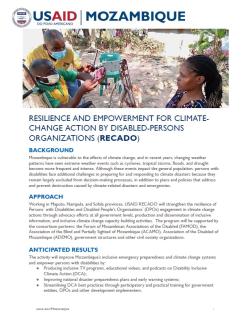
BACKGROUND
Mozambique is vulnerable to the effects of climate change, and in recent years, changing weather patterns have seen extreme weather events such as cyclones, tropical storms, floods, and drought become more frequent and intense. Although these events impact the general population, persons with disabilities face additional challenges in preparing for and responding to climate disasters because they remain largely excluded from decision-making processes, in addition to plans and policies that address and prevent destruction caused by climate-related disasters and emergencies.
APPROACH
Working in Maputo, Nampula, and Sofala provinces, USAID RECADO will strengthen the resilience of Persons’ with Disabilities and Disabled People's Organizations’ (DPOs) engagement in climate change actions through advocacy efforts at all government levels, production and dissemination of inclusive information, and inclusive climate change capacity building activities. The program will be supported by the consortium partners: the Forum of Mozambican Associations of the Disabled (FAMOD), the Association of the Blind and Partially Sighted of Mozambique (ACAMO), Association of the Disabled of Mozambique (ADEMO), government structures and other civil society organizations.
ANTICIPATED RESULTS
The activity will improve Mozambique’s inclusive emergency preparedness and climate change systems and empower persons with disabilities by:
Producing inclusive TV programs, educational videos, and podcasts on Disability Inclusive Climate Action (DCA);
Improving national disaster preparedness plans and early warning systems;
Streamlining DCA best practices through participatory and practical training for government entities, DPOs and other development implementers.
Establishing of coordination platforms for government entities, DPOs, and key stakeholders to ensure DCA policies and procedures sustainability; and
Conducting research to enhance the amount of data available on DCA.
|

